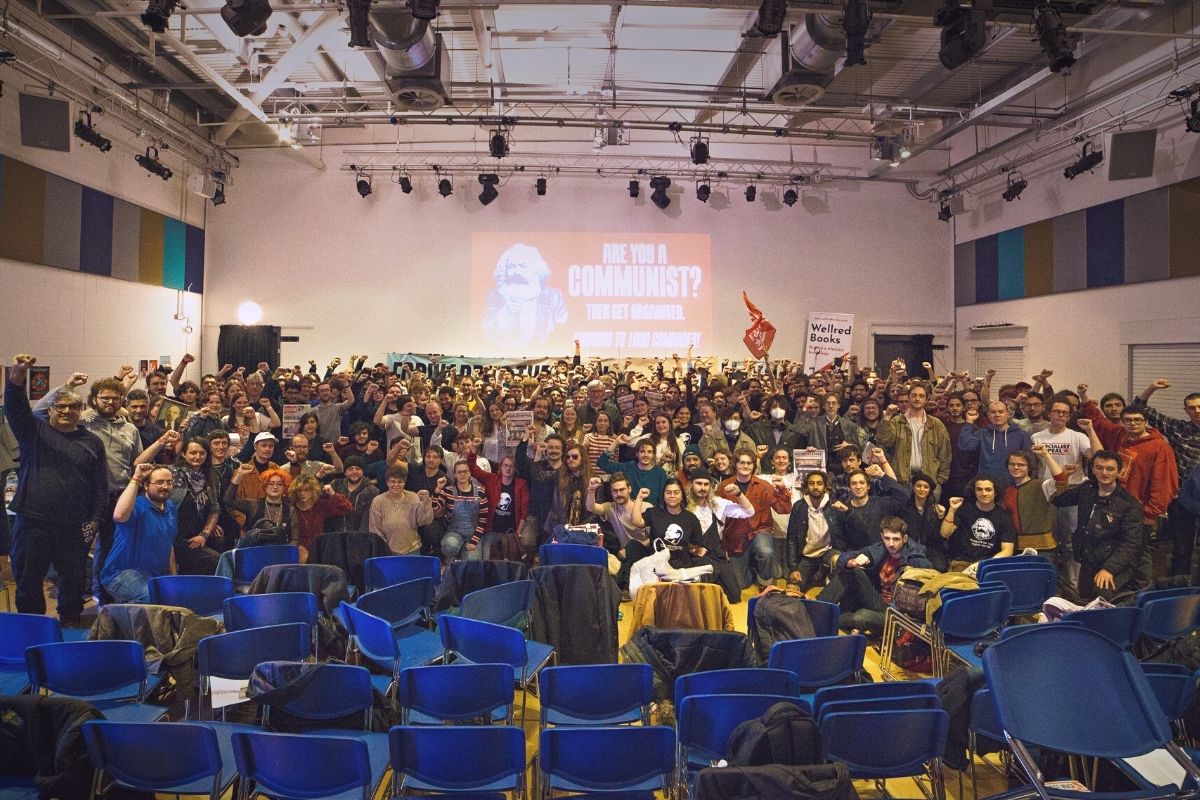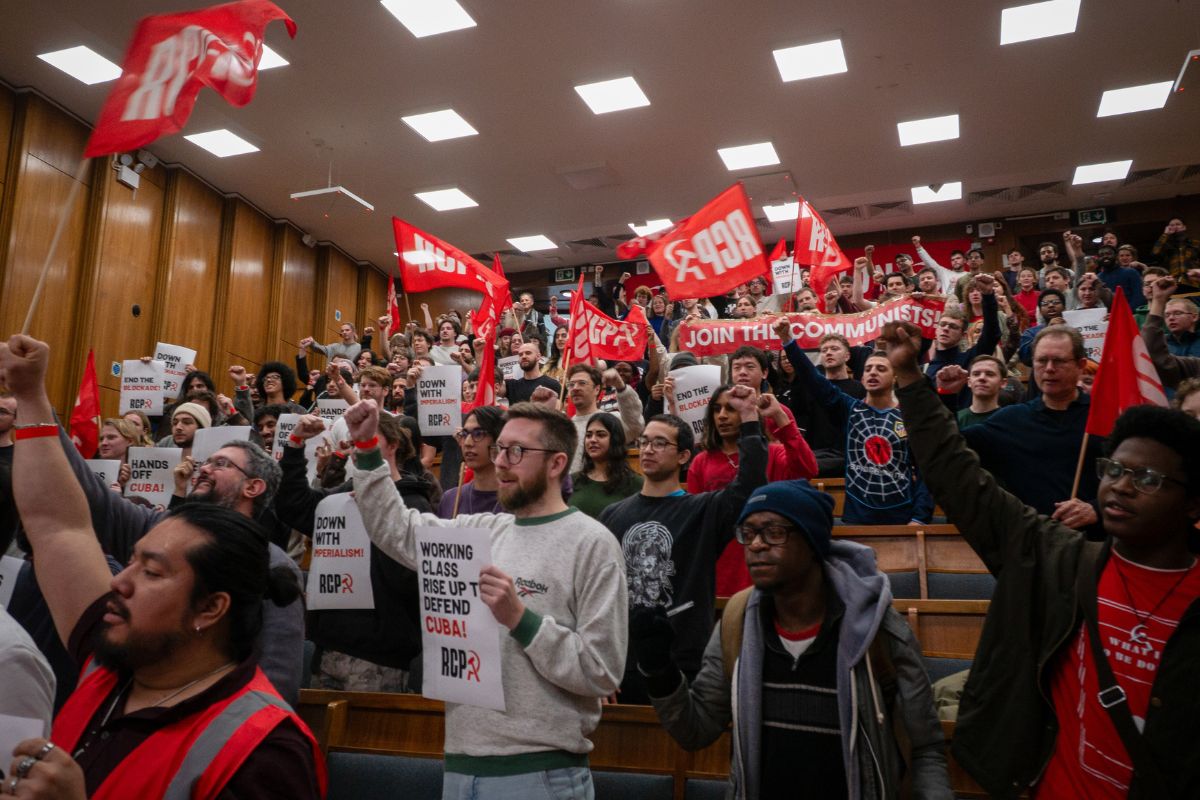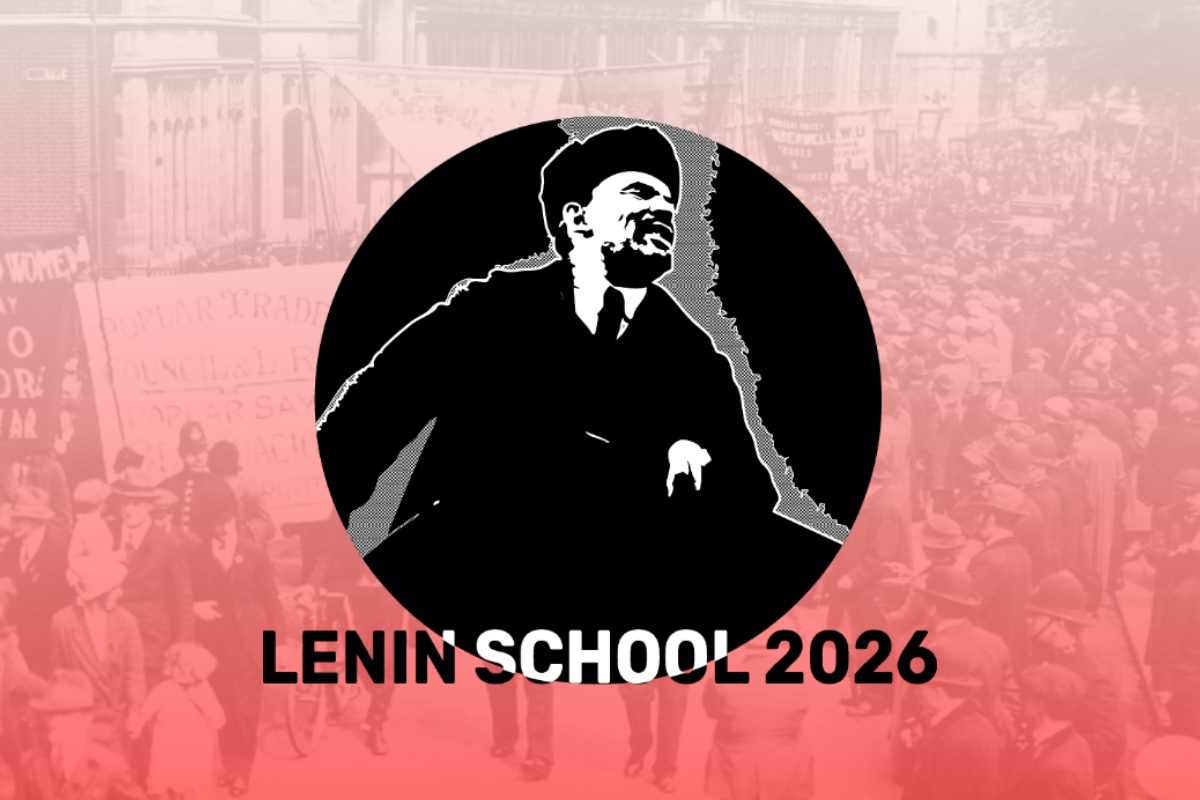Last weekend, around 400 revolutionary activists from across the country gathered in London for the Socialist Appeal 2023 national congress.
The atmosphere at the event was electric from beginning to end. With the crisis deepening by the day globally, and the class struggle in Britain heating up, there was no shortage of material for the discussions.
Comrades also attended in person from Austria, Canada, France, Ireland, Poland, Sweden, and the USA, demonstrating the tremendous breadth of the International Marxist Tendency (IMT), which is growing across the world.
Socialist Appeal, the British section of the IMT, is no exception. All the contributions over the weekend emphasised how the organisation is going from strength to strength, both quantitatively and qualitatively.
And this conference marked a real landmark, with Socialist Appeal editor Rob Sewell announcing on Saturday morning – to rapturous applause and cheers – that the tendency has now smashed past the figure of 800 members.

With a palpable mood of determination and enthusiasm on display, alongside an impressive grasp of Marxist theory and ideas, this congress was a true launchpad for the next milestone: to reach one thousand comrades in Britain, and build a strong revolutionary leadership for the movements of workers and youth that are erupting all around us.
The message coming out of the conference was clear, in this respect. There has never been a better time to get involved in the struggle for socialism. The Marxists are on the march! We are recruiting for revolution! So get in touch and join us today!
Crisis and class struggle
The congress opened on Friday evening with a discussion on the perspectives for world revolution, introduced by Alan Woods – editor in chief of In Defence of Marxism and leading member of the IMT.

It is clear that it is not just British capitalism that has found itself at an impasse, but the entire global capitalist system.
As Alan and others explained, the ruling class is desperately scrambling for a solution, clutching at straws, as it finds itself thrown from one crisis to the next – each deeper than the last.
The monster of inflation, previously thought by bourgeois economists to be dead and buried, has reared its head once again, just as the Marxist warned. This has massively accelerated the chasm between the rich and poor, sharpening the class struggle in all countries.
The war in Ukraine, with no end in sight, has poured petrol on the flames, adding to the economic, social, and political instability.
Similarly, the collapse of banks like SVB – and now Credit Suisse – reveals the potential for contagion across the financial system as interest rates rise.
Households, businesses, and governments have accumulated a mountain of debt over the past period, as the capitalists sought to temporarily stave off previous crises. But now all the chickens are coming home to roost.
All of this has led to the masses rising up across the world. From insurrectionary struggles in Sri Lanka, Iran, and Peru; to militant protests in France and Greece: workers and youth everywhere are looking for an alternative to this decaying system.
And the International Marxist Tendency is urgently building, as comrades emphasised, in order to provide the ‘subjective factor’ of revolutionary leadership that is tragically missing in all countries.
Social decay
Saturday opened with Rob Sewell, editor of Socialist Appeal, introducing the discussion on the perspectives for Britain within this world context.
The past year has seen plummeting living standards for workers, with inflation running rampant at over 10%, and the price of food, rent, and bills rising even faster.
Rob and other comrades noted that predictions for UK economic growth were worse than for any of the other G7 countries, behind even sanction-hit Russia.

But the degeneration of British capitalism can be seen not only in economic terms. The discussion covered how the pillars of the establishment are also rotting before our very eyes, with crises breaking out in the Tory Party, the monarchy, the police, the BBC, and more.
Many contributions highlighted different aspects of the social decay in Britain. The fabric of society – from the NHS, to education, to housing – is being torn apart by austerity and privatisation. Families are increasingly relying on debt to make ends meet from day to day.
And as the crisis intensifies, it is impacting even layers that were formerly considered ‘privileged’, as junior doctor, teacher, and university lecturer comrades testified in relation to strikes in their sectors.
Strike wave
Rob and others also drew attention, in this respect, to the most important aspect of the past year: the reawakening working class.
A powerful strike wave has swept across Britain, with the greatest level of industrial activity in decades – including huge mobilisations of around half-a-million workers on both 1 February and 15 March.
Confusion currently reigns in relation to these disputes, with health union leaders and others attempting to foist rotten Tory deals on their members. Nevertheless, as comrades emphasised, these recent strikes are only the opening shot in a wider class war, which is far from over.
The pressure from below, meanwhile, is beginning to find a reflection inside the trade unions, with new left leaderships emerging – for example in Unite, around Sharon Graham.
In the process, more and more workers, looking for a way forward, will be drawn towards the ideas of Marxism. It is our task to organise these layers, and build the militant leadership that is desperately needed in the British labour movement.
Revolutionary youth
Above all, however, the Marxists are focussed on the extremely radical mood amongst the youth.
Fresh layers of young workers – from nurses through to Amazon warehouse workers – are entering the class struggle: people who have never engaged in any kind of industrial action before.
At the same time, recent polls have found that almost a third of young people in Britain consider themselves communists. This same radicalisation exists everywhere, creating fertile ground for the ideas of Marxism.

This was emphasised in the international report given on the Saturday evening by Fred Weston, a leading member of the IMT, who highlighted the organisation’s successes across the world.
On the basis of a firm approach to Marxist theory, and an orientation towards revolutionary youth, the IMT has seen a strengthening internationally – with a rapid development of existing sections, alongside new groups in countries like Ireland, Chile, and Sri Lanka.
The conference was very lucky, in this respect, to hear from visitors from Ireland, Canada, and the USA, who all spoke about the inspiring steps being taken by IMT comrades in these places.
Fighting fund
A running theme throughout all the discussions was the urgent need to build a Marxist leadership that is capable of becoming a factor in the explosive events that impend; that is capable of turning ideas into a material force, in order to transform society.
The foundations for such a force are being laid by the IMT in Britain and internationally: not only in terms of growth and political education, but also financially.
At last year’s congress, we launched a campaign to raise £200,000 in Britain, to go towards the purchase of a new office. And it was announced over the weekend that this target had been successfully smashed.
Adding to this, Josh Holroyd led a collection on Saturday evening to raise further fighting funds, to help continue the organisation’s campaigning in the year ahead. This saw an outstanding £51,000 being donated by branches – a sign of the revolutionary sacrifice that comrades are willing to make.
In the words of Leon Trotsky:
“We are fighting for genuine scientific ideas and principles, with inadequate technical, material, and personal means. But correct ideas will always find the necessary corresponding means and forces…There was never a greater cause on earth.”
Building the organisation
The question of revolutionary sacrifice was another important motif throughout the weekend – stressed by many comrades as being one of the vital ingredients required to build the forces of Marxism.
The Sunday of conference was dedicated to this question. Ben Gliniecki, a leading member of Socialist Appeal, opened the discussion on building the organisation, providing a report on the successes and priorities of the Marxists in Britain.
Ben highlighted how far the tendency has come, whilst also emphasising the task ahead: to reach the 1000 membership milestone as soon as possible.
Other contributions continued in this vein, with comrades from across the country speaking about different aspects of the work locally; sharing advice on questions such as recruitment, education, finances, and the paper.
In particular, delegates spoke about the enthusiasm that they have found for the Socialist Appeal paper – on the streets and campuses; on protests and picket lines.
Supplemented by the In Defence of Marxism magazine, a revamped website, and an incredible array of publications by Wellred Books, comrades have a full arsenal of Marxist ideas at their disposal: the greatest weapon that we possess in the fight for socialism.
Forward to the 1000!

Before leading a rousing rendition of the Internationale, Rob Sewell concluded the conference with a stirring call to arms, explaining the revolutionary potential that exists in Britain and internationally.
Only the IMT has the ideas, perspectives, and methods necessary to build the strong revolutionary leadership that history demands.
We have much work to do. But we have a world to win.
The communists are coming! Forward to the 1000! Forward to the socialist revolution!






